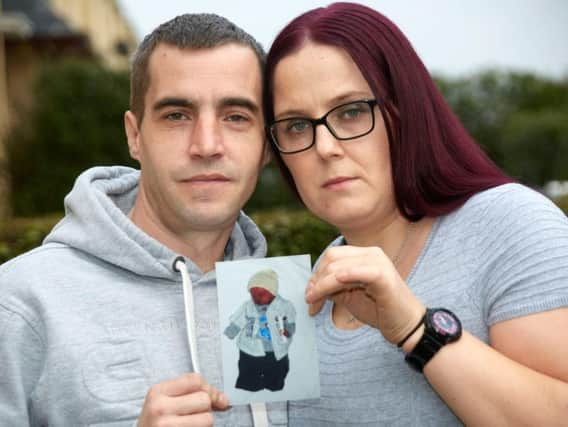Doncaster mum's stillborn pregnancy hell


Mum Kelly Attree, whose pregnancy was classed as ‘high risk’ as she was carrying twins and was diagnosed with gestational diabetes, delivered a healthy girl, Bliss, at 37 weeks.
But Mrs Attree’s son, Samuel, was delivered stillborn.
Solicitors acting on behalf of the family claim errors during scanning meant the hospital failed to spot he had not grown in the previous five weeks, and that he had died a week earlier.
Advertisement
Hide AdAdvertisement
Hide AdThe Doncaster and Bassetlaw Hospitals Trust, which runs Doncaster Royal Infirmary, has agreed to pay Mrs Attree, who has three older children aged 11, 15, and 18 with husband Tom, a five-figure sum.
After obtaining medical records and consulting with independent experts, medical negligence specialists Hudgell Socilitors say during scans to measure her babies’ sizes, Samuel was ‘over-measured’ at weeks 33 and 35 – giving the inaccurate impression he was growing.
Hudgell Solicitors have claimed hospital staff failed to spot her son stopped growing from 31 weeks onwards.
That was despite her being scanned 10 times during the course of the pregnancy.
Advertisement
Hide AdAdvertisement
Hide AdIt was only when Mrs Attree was booked in for an induction at 37 weeks that she was told her baby boy had died.
Mrs Attree said: “Even though I know it wasn’t my fault, I beat myself up because I had gestational diabetes and wonder if that was part of why it happened.”
Mr Sewa Singh, Medical Director for the Trust, told The Star: “On behalf of the Trust, I want to say sorry to Mrs Attree and her family for their tragic loss.
“As ever we will seek to identify any lessons we can learn from this sad event to continue to improve the quality and safety for mothers and babies.”
Advertisement
Hide AdAdvertisement
Hide AdIndependent medical experts consulted by the national law firm concluded that had the measurements been recorded correctly, the sonographer would have had to alert the mum’s consultant and conduct further checks, such as a placental blood flow check, enabling them to realise Samuel was in danger and therefore deliver the twins early.
Mrs Attree, 40, who has three older children aged 11, 15, and 18 with husband Tom, in addition to Bliss, now four, had been admitted to hospital several times in the run up to the delivery.
She had been experiencing ‘tightenings’ but was always monitored and then sent home.
She was eventually booked in to be induced at 37 weeks, and all the while she had been led to believe her babies were healthy.
Advertisement
Hide AdAdvertisement
Hide AdWhen she arrived for the induction of her twins, on September 21, 2011, a midwife routinely checked her babies’ heart rates, and she was told by staff they could not find a heartbeat for
Samuel.
Mrs Attree said: “We were so excited to pack the bags and go to hospital, and my children were expecting us to bring two babies home, but we didn’t.
“When I arrived at hospital the midwife found my daughter Bliss’s heartbeat straight away and went to find Samuel’s and went quiet. She went off to get someone else, and they said they were really sorry but they couldn’t find Samuel’s heartbeat. I just screamed. It was like I was in a dream afterwards, I felt like I was in a trance.
“I hadn’t had any reason to worry, if anything, I had felt more movement in the later stages of the pregnancy, but I have since been told that babies can be more active in their last hours, and that is something that haunts me now.”
Advertisement
Hide AdAdvertisement
Hide AdAfter learning her son had died, Mrs Attree insisted on a Caesarean Section. She was given a general anaesthetic so was asleep for the delivery, and suffered a haemorrhage afterwards, losing two pints of blood.
Daughter Bliss was delivered safely, and Samuel was placed in a cot near her bed in a single suite away from the ward.
Mrs Attree was distressed when she held her son as he had not been washed and she could not get a lock of his hair as it was matted with blood.
She added: “When I left hospital after the delivery, they gave me his items back and I went to get his blanket and found his clothes were blood stained. It was impossible to get a lock of hair as it was matted. I was in a single room, but I could hear other women giving birth. It was absolutely horrendous.”
Advertisement
Hide AdAdvertisement
Hide AdThe couple had Samuel baptised and later held a funeral for him.
Four years after his death, Mrs Attree is still suffering with feelings of guilt over his death.
She says she has become fiercely protective of Bliss, and has been diagnosed as suffering from an adjustment disorder, after experiencing flashbacks, nightmares, and negative ‘what if’ thoughts.
Medical negligence specialist Helena Wood from Hudgell Solicitors said: “The independent medical opinion was that the hospital missed several opportunities to spot Samuel’s lack of growth, and therefore missed chances to save him.
Advertisement
Hide AdAdvertisement
Hide Ad“They should have realised there was a problem when they scanned her at both 33 and 35 weeks. Mrs Attree was a high risk pregnancy and she had been admitted to hospital on several occasions and therefore there were many opportunities to save Samuel.
“Our independent obstetrician was of the view that, had the problem been identified, the twins would have been delivered by around 35 weeks gestation, and had that been done, Samuel would have survived.
“The loss of Samuel has had an enormous impact on his mother, father, and siblings. The family feel unable to celebrate Bliss’s birthday, as it inevitably is a reminder of Samuel’s death.
Mrs Attree is now involved with Angel Parents, a support group for parents coping with the loss of a baby, which is campaigning to have a national day of remembrance for baby loss.